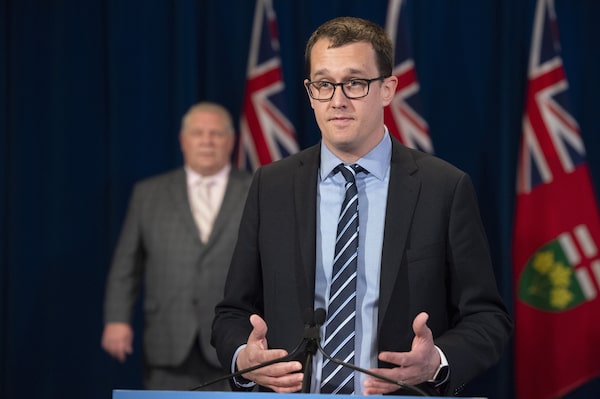
Labour Minister Monte McNaughton says the changes are primarily meant to make Ontario more attractive to talented tech workers who often face these clauses in employment contracts.Frank Gunn/The Canadian Press
The Ontario government introduced legislation on Monday that would ban the practice of imposing non-compete clauses on employees, a growing trend that the province’s Labour Minister says is often used to intimidate workers.
The move, which would be the first such ban in Canada, is primarily meant to make Ontario more attractive to talented tech workers who often face these clauses in employment contracts, Labour Minister Monte McNaughton told The Globe and Mail before the bill was tabled.
But he added it is also needed to block the increasing imposition of non-compete clauses even on low-wage workers, a practice common in the United States that critics say depresses wages and reduces labour mobility.
“I see that as an injustice,” Mr. McNaughton said in an interview. “I don’t want that coming to Ontario.”
A non-compete clause typically attempts to ban an employee from taking their talents to a competitor after leaving their job – sometimes for years. The growing use of these clauses has been flagged as a problem across North America.
Several U.S. states have brought in rules restricting their use, especially for lower-wage workers, who in some cases have faced bans that kept them from simply seeking better paying work. U.S. President Joe Biden issued an executive order in July that asked the Federal Trade Commission to curtail the “unfair use of non-compete clauses ... that may unfairly limit worker mobility.”
California’s restrictions on such agreements have been partly credited by some for the success of Silicon Valley in attracting tech talent and allowing workers to move between different companies and startups more freely. Mr. McNaughton said he hopes Ontario’s ban on non-competes will help attract top tech talent from the U.S. and elsewhere.
Despite being common in employment contracts in Ontario, non-compete clauses are already almost never upheld when challenged in Ontario courts. But most employees are unaware of this, leaving them vulnerable, said Stuart Rudner, a veteran Toronto labour lawyer who acts for both employers and employees.
“They’ll put a non-compete in there just because it scares people,” Mr. Rudner said. “So this legislation may go a long way toward alleviating that.”
Mr. McNaughton said the proposed changes, which would amend the Employment Standards Act, would still allow companies to forbid departing employees from using intellectual property or confidential information, and non-compete clauses would still be allowed in some cases where a business is sold. The changes would also still allow for agreements that block ex-employees from soliciting their former employer’s clients, which are also common and more often upheld in court.
The new legislation is being introduced as part of an omnibus bill on Monday that includes other proposed changes Mr. McNaughton announced last week, including a crackdown on exploitative temp agencies, a guarantee that delivery workers can have access to washrooms, and moves aimed to make it easier for foreign non-medical professionals to have their credentials recognized in Ontario.
His approach on these and other issues has won praise from some private-sector unions. It contrasts with moves the Progressive Conservative government of Premier Doug Ford made after it was first elected in 2018, before Mr. McNaughton took on his current post, when it scrapped a minimum-wage increase and eliminated two guaranteed paid sick days brought in by the previous Liberal government of Kathleen Wynne.
Mr. Ford also spent months in the pandemic rejecting calls from mayors, medical officers of health and medical experts to bring in guaranteed paid sick days for workers to combat workplace COVID-19 outbreaks, until finally relenting in April.
Mr. McNaughton said he plans to introduce what he says will be more improvements for workers after a blue-ribbon panel he convened on the challenges of the new “gig economy” delivers its recommendations in the coming weeks. He said his goals are to boost paycheques and to create more opportunities for workers to find jobs with pensions and benefits.
“It’s who I am,” he said. “I made a decision 2½ years ago when I was asked by Premier Ford to be the Minister of Labour to be on the side of workers. I think the pandemic has clearly highlighted some injustices that are out there.”
Our Morning Update and Evening Update newsletters are written by Globe editors, giving you a concise summary of the day’s most important headlines. Sign up today.
 Jeff Gray
Jeff Gray